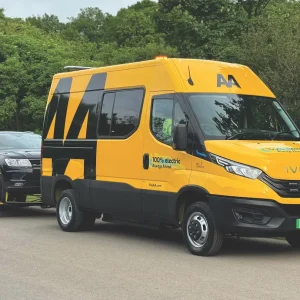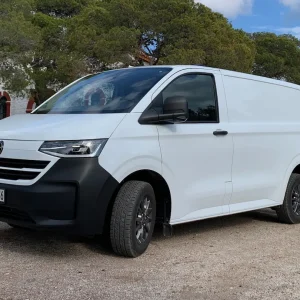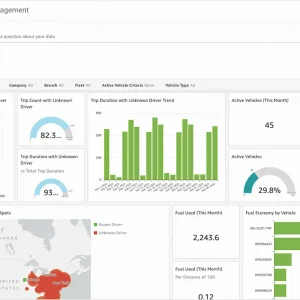Iveco
Giuliano Giovannini, sales and marketing product director
 What are you working on so far as alternative power sources are concerned?
What are you working on so far as alternative power sources are concerned?
We’ve invested heavily in compressed natural gas (cng) and there are over 10,000 cng-fuelled Ivecos now in service around Europe. We market a cng Daily and we also produce cng version of our Eurocargo and Stralis trucks. We believe that cng is a good choice of fuel if you’re on city centre delivery work. It offers a low level of exhaust emissions and we reckon that our cng engines already almost meet the planned Euro-6 emission standard.
Aren’t you concerned, however, about the lack of a cng distribution network in some countries? In the UK for example there are virtually no service stations with cng pumps.
We’re aware that this is an issue and we suspect it’s one we’ll have to live with for some time. Many big fleets that have decided to opt for cng have invested in their own refuelling stations, however. We know of one operator that is running its vehicles on biogas that it makes itself from recycled refuse. It has exactly the same properties as cng.
 Are you developing hybrids too?
Are you developing hybrids too?
We’ve got a small fleet of hybrid Daily vans on trial in Italy and we’ve been contacted by a lot of major operators around Europe who have expressed interest in them. The vans are proving successful and capable of achieving a fuel saving of up to 25 per cent on urban work. As a consequence we’ll start to put them into limited production in 2009. Thereafter we believe that hybrid models could account for up to five per cent of Daily production in Europe within the next five to six years.
Are you also developing vans that will run solely on battery power?
Yes, but we think they will continue to be niche products; more so than hybrids. Remember though that the bulk of Daily light commercials are likely to be powered by diesel engines for sometime to come.
What’s your view of biodiesel? Its critics argue that it is partly responsible for the rise in global food prices because it is made out of industrial crops that are being grown in place of wheat, rice, potatoes and so on. Should we be waiting instead for so-called second-generation biodiesel made from waste matter?
Definitely and one of the big advantages of biodiesel is that engines can burn it without any dramatic technological changes being required. However, we think that the best and most efficient way of using it is to mix an increasing percentage of it into standard diesel rather than operators here and there running on it 100 per cent.
Mercedes-Benz
Wilfried Porth, worldwide head, Mercedes-Benz vans
 What are you doing to reduce the impact of your vans on the environment?
What are you doing to reduce the impact of your vans on the environment?
Most of our vehicles are sold with highly-efficient diesel engines and particulate filters, but at Hanover we’ve gone one stage further. We’ve introduced the BlueEfficiency Vito, with an ECO-Start system that automatically switches off the engine when the driver is stationary in traffic, significantly improving fuel economy and reducing exhaust emissions. It’s fitted with a six-speed gearbox and a package of aerodynamic aids, again for greater fuel efficiency. We’ve developed different versions; one designed specifically for in-town delivery work, one designed for mid-range work and one designed for long-range runs. The aim is to give the customer exactly what he needs for his business.
What else are you up to?
We’ve come up with natural gas vehicles and hybrids too.
How much will environmentally-friendly technology add to the cost of a van?
A hybrid Vito might cost up to an additional €10,000 (£8,000) depending on the exact specifications. But something like ECO-Start typically costs no more than around €200 (£160).
 We’ve seen major increases in the cost of steel, aluminium, plastic and virtually everything else that goes into a van. Are you putting up your retail prices as a consequence?
We’ve seen major increases in the cost of steel, aluminium, plastic and virtually everything else that goes into a van. Are you putting up your retail prices as a consequence?
These increases are affecting all manufacturers of course, and up until now the industry has not passed them on to the consumer to any great extent. At Mercedes we’ve absorbed them and offset their impact on us by improving production efficiency. If there are further increases I cannot rule out retail price rises, but we won’t be on our own. The whole industry will be in the same boat.
Lengthening lead times were a problem for Mercedes-Benz last year, as they were for a number of other manufacturers. I gather the situation has eased since, so if a customer asks a dealership to order a van from the factory today on his behalf, how long before he can take delivery?
There is no single answer. It varies from country to country, but I would say from four to eight weeks depending on the model concerned.
It’s not that long since you launched the new Sprinter. Do you plan to make any changes to Vito in the foreseeable future?
It will receive a facelift next year.
Will you be taking the opportunity to slot a medium roof model in between the standard roof and the high roof ?
No. We don’t think the investment that would be necessary to put it into production would be covered by the demand.
Peugeot
Jean-Philippe Collin, director general
 What’s going to happen to the van market across Europe in 2009 in the wake of the credit crunch?
What’s going to happen to the van market across Europe in 2009 in the wake of the credit crunch?
It’s going to be tough. I think that on average the market will face somewhere between a mid single-digit and a low double-digit percentage decline. We’re forecasting the worst, but hoping for the best. So far as the UK van market is concerned we think it may touch bottom at the end of this year/start of next year. After that we’re hoping it will stabilise.
The new Bipper van is assembled in Turkey, which has the advantage of low labour costs. Would you like to see Turkish facilities, or perhaps factories in the low-cost countries of eastern Europe, used to assemble other models? I appreciate that, like Bipper, Expert and Boxer are produced in conjunction with Fiat and your sister company Citroën; Citroën and Peugeot operate under the PSA banner.
As it happens our plant at Vigo in Spain, which produces Partner and Citroën’s Berlingo, is one of the most competitive plants in our group, and indeed one of the most competitive plants you’ll find anywhere. Remember that wages are only part of the equation. You’ve also got to think about productivity, quality, the supplier base around the factory, the cost of transporting vehicles from one country to another and whether or not the plant concerned is in the euro zone. You’ve got to take wage inflation in Turkey and eastern Europe into account too. There’s also the point that raw materials usually cost much the same wherever you are, but can sometimes be more expensive in low-wage countries. Because of all those factors we intend to keep a solid light commercial production base in Western Europe.
What impact has the increased price of raw materials had on you and are you passing the additional cost on to your customers?
To a degree we’ve been able to offset the impact by productivity gains and by designing our vans so that they use less material. We’ve had to pass on a little bit of the increase, but at the same time we’ve reduced the total cost of ownership for the buyer in order to compensate.
 How are you setting about making your light commercials more environmentally friendly?
How are you setting about making your light commercials more environmentally friendly?
We have literally hundreds of engineers working on making our diesel and petrol engines even more efficient than they are now. The opportunities for progress are huge. For all the talk of electric vans, hybrids and engines that will run on hydrogen, the reality is that the vast majority of light commercials will be powered by highly-efficient petrol and diesel engines for many years to come. That said, we are ready to implement some of those alternative fuel technologies if required. PSA has already got some 10,000 electric vehicles in service around Europe, for instance. One of the difficulties with some of these technologies though is that the supporting infrastructure may not be there. The necessary tax incentives may not be there either and the customer may not be prepared to embrace what you are offering.
Volkswagen launched a purpose-built pick-up at the Hanover commercial vehicle show. Do you have any plans to follow suit and at last introduce a factory-built replacement for the long-gone 504 pick-up to the European market? I note that you were displaying an Expert pick-up converted by Durisotti at the show.
We don’t see a significant demand. But if demand does take off, then we’ll change gear.
Renault
Bruno Morange, senior vice president, Renault Commercial Vehicles
 How hard has the credit crunch hit van sales across Europe?
How hard has the credit crunch hit van sales across Europe?
It’s had a big psychological impact and everybody is waiting to see what will happen next. We’re seeing an average 20 per cent fall in sales across the industry during the second half of this year compared with the first half of 2007 and I believe we’ll see demand drop by from eight to 10 per cent next year.
Has the downturn resulted in reduced delivery times?
That’s clear, although it’s not usually practical to reduce lead times to less than six weeks if a van is being ordered from the factory to customer specifications. With car-derived vans the situation is a little easier. We may be able to supply from stock, so lead times are very short. But although the delivery situation may be good news for customers, the downturn means falling production and that in turn means that factories may have to be closed for several days during the coming months. That’s already happening in Luton, where Trafic is built, and I think all manufacturers will be affected.
 You’ve just launched Kangoo Van and Kangoo Compact in the UK, but they’ve been on sale on the other side of the Channel for several months. How successful are they proving to be?
You’ve just launched Kangoo Van and Kangoo Compact in the UK, but they’ve been on sale on the other side of the Channel for several months. How successful are they proving to be?
They’ve been well-received although some concern has been expressed by dealers that Compact is not available with a sliding side door. We would argue, however that it’s not necessary because the load area is completely accessible from the rear.
What are you doing so far as alternative power sources are concerned?
We’ll be introducing an electric Kangoo in 2010/2011. We’re also working on hybrids in conjunction with Nissan although we won’t see the results until 2012. We have a greater belief in pure electrics than we do in hybrids though because the latter require two engines and that makes them a high cost solution.
How soon before we see a new Master?
It will be at the 2009 Amsterdam commercial vehicle show.
Volkswagen
Stefan Schaller, chairman, Volkswagen Commercial Vehicles
 What impact is the global credit crunch having on van sales?
What impact is the global credit crunch having on van sales?
Unfortunately the UK is one of the countries that have been affected the most by the crisis. We still expect to improve our market share in Britain and achieve over 30,000 sales this year — in fact we expect to achieve record registrations — but many of those sales were made between January and August. Worldwide what we’re seeing is light and shade. While the UK, Spain and the Netherlands have been hit, we’re seeing positive developments in, for example, Russia and Turkey. So we can balance the positive against the negative.
You unveiled your new, purpose-built, Toyota Hilux-, Mitsubishi L200-rivalling 4×2 and 4×4 pick-up at the Hanover Commercial Vehicle Show. When will it go on sale in Britain?
In mid-2010 and it will set a benchmark in terms of fuel consumption of less than 8 litres/100km (35.3mpg). We’ll be selling it both as a basic workhorse and as a high specification model in the way that we do with Transporter.
 So can we expect to see a Sportline pick-up?
So can we expect to see a Sportline pick-up?
Yes.
What are you up to so far as alternative fuels are concerned?
We’ve developed versions of Caddy and Transporter that will run on compressed natural gas and we’ve also come up with BlueMotion versions of certain models — Crafter for example — designed to keep down fuel consumption and emissions. We’ll be using the same concept on the new pick-up.
How about hybrids?
I think a better way is to go straight to pure electric and that’s something we’re definitely thinking about. Our customers treat cost of ownership as a priority and hybrid technology is too expensive for our needs. The fact that electric vans typically have a range of no more than 100km (62 miles) and that it takes sometime to recharge their batteries isn’t necessarily a hindrance. If you’re on city centre delivery work it’s unlikely that you’ll do more than 100km a day and you can charge up the batteries overnight.
Is the rising cost of raw materials forcing you to put your prices up?
So far we’ve been able to counteract it by using our engineering knowledge to take costs out of our vehicles, and of course all of our competitors are in the same boat. However, we may have to implement limited price increases in the near future. Anybody who cuts prices to gain sales won’t make a profit out of doing so in the current climate.





